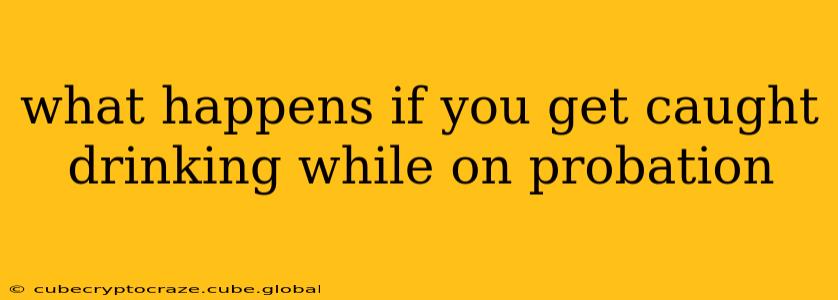What Happens If You Get Caught Drinking While on Probation?
Getting caught drinking alcohol while on probation can have serious consequences, significantly impacting your future. The repercussions depend heavily on several factors, including the specifics of your probation terms, the jurisdiction (state and even county), the severity of the alcohol violation, and your overall probation history. This is not an area where you should take chances; ignoring the rules can lead to significant trouble.
What are the typical consequences of violating probation by drinking alcohol?
This is perhaps the most important question. The consequences can range from relatively minor to extremely severe:
-
Revocation of Probation: This is the most severe outcome. Your probation is terminated, and you're sent to jail or prison to serve the original sentence that was suspended when you were placed on probation. The length of the original sentence, plus any additional time added for the violation, will determine your incarceration time.
-
Increased Probationary Period: The judge may extend your probation for a longer period, requiring you to remain under supervision for an additional time.
-
Increased Supervision: Your level of supervision may intensify. This could mean more frequent check-ins, drug and alcohol testing (possibly including random testing), and mandatory attendance at rehabilitation programs.
-
Community Service: You might be assigned additional community service hours as a form of punishment.
-
Fines: Expect substantial fines for violating your probation conditions.
-
Mandatory Rehabilitation Programs: This might involve attending alcohol education classes, participating in treatment programs, or undergoing counseling. Failure to complete these programs could also lead to further consequences.
-
Jail Time: In some cases, even if probation isn't revoked outright, you may face a short jail sentence for the violation.
How is a probation violation involving alcohol determined?
Probation officers utilize various methods to monitor compliance:
-
Random Drug and Alcohol Testing: This is a common practice to ensure you are abstaining from alcohol. A positive test result is often immediate grounds for a probation violation hearing.
-
Check-Ins and Home Visits: Regular check-ins allow probation officers to assess your behavior and well-being. Home visits may occur to verify your compliance and to check for alcohol or paraphernalia.
-
Reports from Others: Information from family, friends, employers, or even law enforcement can provide evidence of a probation violation.
-
Self-Reporting: Honesty and self-reporting are crucial. Failure to report any potential violations can make the situation far worse.
What should you do if you're struggling with alcohol while on probation?
If you're finding it difficult to stay sober while on probation, it's critical to seek help immediately. Don't wait until you've violated your probation. Contact your probation officer, your attorney, and seek help from addiction treatment centers or support groups like Alcoholics Anonymous. Proactive steps to address your alcohol use are far more beneficial than facing the consequences of a violation.
Can I get my probation modified if I have a drinking problem?
In some cases, it may be possible to modify your probation terms if you demonstrate a genuine commitment to addressing your alcohol problem. This requires working closely with your probation officer and your attorney. They can advise you on the possibilities and the best way to proceed. Seeking professional help and showing a sincere commitment to rehabilitation are essential factors in a successful modification.
Remember, this information is for general knowledge only and should not be considered legal advice. If you are facing probation violation charges, immediately consult with a qualified attorney in your area. They can provide personalized advice and guidance based on your specific circumstances and legal jurisdiction.
